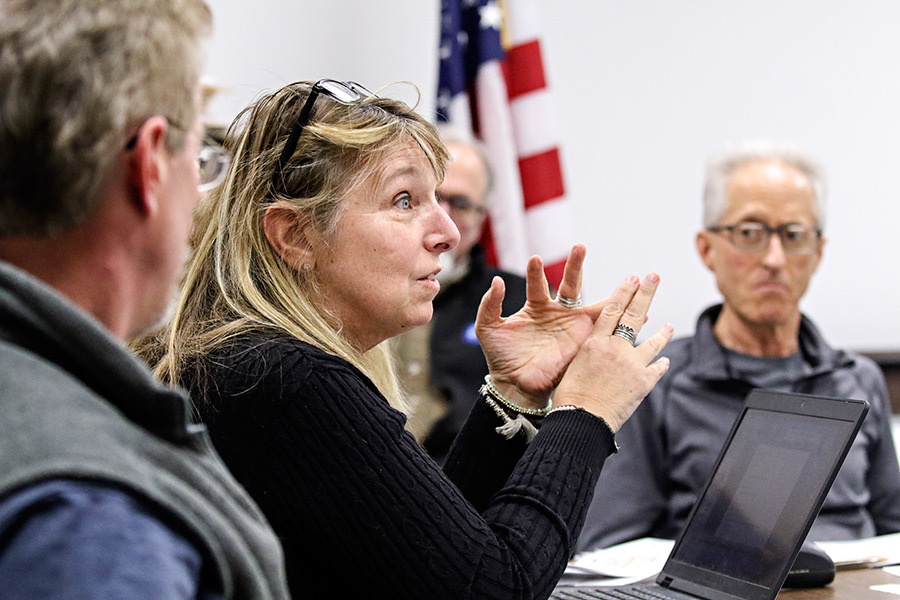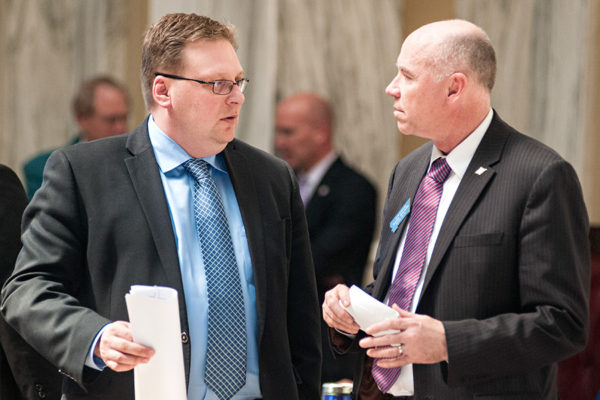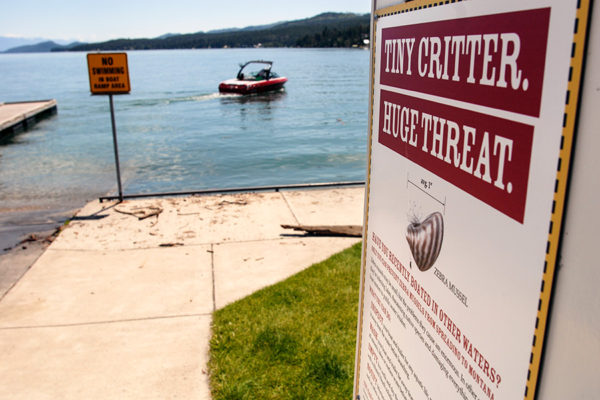Flathead Basin Commission Budget Gutted
Local lawmakers pledge to keep water quality watchdog group alive in the midst of cuts by state
By Tristan Scott
The Montana Department of Natural Resources and Conservation is eliminating funding for Northwest Montana’s foremost water-quality watchdog group, a decision the state says is necessary to backfill a sizable budget gap, while proponents of the group and local lawmakers contend it was zeroed out due to a fierce independent streak that ran counter to state agencies.
Under pressure to drum up money from within the DNRC, Director John Tubbs recommended cutting the Flathead Basin Commission’s entire budget for fiscal year 2018, which totaled $148,932, as well as its budget for fiscal year 2019. Tubbs said his agency saw no relief during the recent special session to address the budget shortfall, which instead foisted the DNRC with an additional $4 million in reductions in the form of fund transfers.
Caryn Miske, executive director of the Flathead Basin Commission and the group’s only paid full-time staff member, said depleting the group’s funding not only delivers an inequitable and devastating blow, but it also makes little sense, hardly alleviating the state’s crushing $227 million budget shortfall. Rather than placing a burden on the state’s general fund, she described the Flathead Basin Commission as a golden goose, which more than quadruples its budget every year by applying for grants and establishing partnerships.
“This was put forward as a proposal to cut the budget, and you can look at it from the perspective that somebody’s ox has to be gored in the face of revenue shortfalls,” Miske said, noting that her positions were often at odds with administrators. “But to completely terminate an agency that was making the state money and making its partners money makes no sense. You really have to ask yourself what is going on.”
Established by the Montana Legislature in 1983 as an independent body, the Flathead Basin Commission has stood sentry over the region’s prized local waters for nearly 35 years, and is administratively attached to the DNRC, the agency it is also charged with holding accountable.
Initially created to stave off mining and drilling efforts along the Canadian Flathead River north of Glacier National Park, the Flathead Basin Commission has since tackled a range of issues, including providing additional layers of defense to statewide prevention efforts aimed at keeping aquatic invasive species like mussels out of the state’s water bodies.
But members of the Flathead Basin Commission have at times rankled state officials, who bristled under critiques about what the group describes as shortcomings in Montana’s aquatic invasive species prevention efforts, including the Montana Fish, Wildlife and Parks’ Watercraft Inspection Program.
Acknowledging that the DNRC and FWP have butted heads with Miske and the commission, Tubbs said eliminating its budget was not a punitive act of retaliation, but a matter of necessity.
“For my entire tenure, I have been concerned with what the executive director’s relationship has been with the state,” Tubbs said. “She has not hidden the fact that she believes the state agencies are not good actors. But the bottom line is that I personally have a very large hole to fill in a state agency’s budget. That is not a vendetta. That is the reality of funding a state agency. Hard choices have got to be made.”
In the waning hours of the Montana Legislature’s special session, which ran Nov. 14-16, a quorum of Republican Flathead lawmakers said they approached Tubbs about maintaining funding levels for the commission, or at least appropriating some money to maintain Miske’s position.
Rep. Mark Noland, R-Bigfork, said Tubbs made it clear he had made up his mind.
“We asked him to keep the Flathead Basin Commission going and he chose not to,” Noland said, adding that local legislators are collaborating on an effort to raise funds to keep the commission alive.
“We are not going to just let it die on the vine,” he said.

Noland said the Flathead Basin Commission has been instrumental in furnishing safeguards on the Columbia River Basin and the largest freshwater lake in the West. But Noland said it has also served as a barb in the side of the state agencies it watchdogs, which prefer to operate unilaterally.
“The DNRC and FWP don’t want anybody else to have any say in this process. They feel like what they are doing is adequate. And we don’t agree,” Noland said of the state programs to combat aquatic invasive species. “We like having the Flathead Basin Commission holding the state’s feet to the fire, and they want to drop that hot potato.”
Both locally and statewide, efforts to reduce the risk of aquatic invasive species spreading through Montana’s water bodies have ramped up in response to the positive detection last fall of invasive mussel larvae east of the Continental Divide in Tiber Reservoir, as well as their suspected presence in Canyon Ferry Reservoir and the Missouri River near Townsend.
The Flathead Basin Commission’s efforts to curb the threat of invasive mussels entering Montana have included funding watercraft inspection stations on the Blackfeet Indian Reservation, which proved effective.
“With the efforts of the Flathead Basin Commission setting up early inspection stations, we were able to catch these fouled boats coming over the Continental Divide,” Noland said. “The FWP didn’t have anything in place early in the season, and our stations were detecting fouled boats. So if the Basin Commission goes away, this could be very detrimental to our greatest resource.”
Jack Stanford, former director of the University of Montana Flathead Lake Biological Station, said the commission has compiled a list brimming with environmental victories in the Flathead, including eliminating the threat of development from oil and coal companies, improving sewage and wastewater treatment in Kalispell and prompting Burlington Northern to improve its standards of safety for oil and coal trains tracking along the Flathead River corridor.
“As for the Basin Commission interacting negatively with state agencies, I would just say that usually happened when the agencies were not doing their job,” he said. “So even in that respect they did the public a really positive service.”
Along with Rep. Mike Cuffe, R-Eureka, Noland helped carry House Bill 622, a measure to fund an expanded suite of aquatic invasive species prevention efforts that included a pilot program designed to enhance protection from invasive mussels in the Flathead Basin, and which authorized the Flathead Basin Commission to manage it. The measure also increased state expenditures to combat aquatic invasive species from less than $1 million to more than $6.5 million annually.
The program would add more certification stations, track vessels that require decontamination and add the use of automated inspection and detection devices. It also gave the commission authority to petition the state’s Fish and Wildlife Commission to adopt rules for the Flathead Basin that would require inspection of all vessels before they launch; prohibit or restrict some vessels, including seaplanes and aquatic weed harvesters; and close waters where invasive mussels have been detected until a containment strategy was implemented.
The pilot program would have been paid for by requiring boat owners launching boats in the Flathead basin to purchase a sticker, a program expected to raise $1.5 million in revenue.
But FWP officials said the legislation as written did not give the agency the enforcement authority to require boat owners to purchase a sticker because it didn’t include the word “mandatory,” nor did it provide for any penalties should boaters refuse to obtain the sticker.

Thompson Smith, the outgoing chairman of the Flathead Basin Commission, as well as Noland, said attorneys with FWP reviewed the legislation prior to its passage, amended the language and assured them there were no problems with the bill.
Smith said delaying implementation of the pilot program and its added layers of protection is flirting with disaster.
“There is no margin of error here. It is sort of like handling plutonium. You screw up once and you are in deep trouble,” Smith said. “The Flathead Basin Commission has been blunter about the shortcomings of the statewide program than they would have liked us to be. But we were either in the position of saying nothing and violating the purpose and the mission and the spirit of the Flathead Basin Commission, or being honest about the deficiencies and calling for stronger measures.”
So far, the traces of contamination are restricted to the Missouri River Basin, but the likelihood of mussels hitchhiking on the hulls of boats or in bilge water or cloistered away in irrigation equipment has risen to a fever pitch. The threat of mussel infestation hits especially close to home for those working to protect the waters of Flathead Lake and its surrounding network of rivers and creeks, and it comes to rest at the doorstep of the Columbia River Basin — the only major watershed in the West still believed to be free of quagga and zebra mussels.
Thompson said the Flathead Basin Commission has been at the vanguard of efforts to keep it that way.
“We have always been more restrained than we could have been and we strived to work with them and complement the program,” he continued. “We have never let loose with the full-on critique of the statewide effort’s shortcomings. We have tried to fulfill our responsibility to the Flathead’s resources by speaking out for what is needed, but without blasting the statewide program as vigorously as we certainly could have.”
Tubbs said he intends to speak with Flathead Basin Commission Chair Jan Metzmaker after the Thanksgiving holiday weekend to discuss a plan to either shut down the commission’s operations or determine whether it can pay its own way.
Miske said the commission has enough money that was not attached to base dollars that will fund its operational budget for up to five months.
“That gives us a little bit of time to figure out what to do,” she said.
The Flathead Basin Commission will finish out the fiscal year under the umbrella of the DNRC, she said, and beginning next year Miske will likely be furloughed and the commission will have to raise enough money to support itself until 2020. Even if the Montana Legislature, which next meets in 2019, agrees to find new revenue channels to fund the Flathead Basin Commission’s operational budget, the money won’t turn up until the following year.
Miske said it’s her hope that the Legislature attaches the commission to an agency it’s not charged with watchdogging, and establishes a budget line item that can’t be tampered with.
It’s also her goal to seek a remedy for the pilot program, which could occur if the Montana Fish and Wildlife Commission votes to adopt it. Even then, it would be a struggle to roll out the program in time for the 2018 field season, she said.
“We could burn through all of 2018 fighting about this, which seems like the most likely scenario,” Miske said.
Tubbs said even without a fully funded commission, DNRC and FWP would work together to ensure check stations continue to monitor trailered watercraft crossing the Continental Divide.
“The state is fully engaged in trying to stand up the best prevention program in the nation to defend against aquatic invasive species. Period,” he said.
Chas Cartwright, the former superintendent of Glacier National Park who previously chaired the Flathead Basin Commission, said that while he has confidence the commission will continue to exist, losing its relationship with the state is an unfortunate outcome.
“We can raise the funding. We created a nonprofit to raise money because we saw the writing on the wall. But the thing we are losing that is essential is the connection with the state,” Cartwright said. “We have the Legislature behind us, but we need a connection with the state beyond the Legislature. Now we’ll be going it alone.”